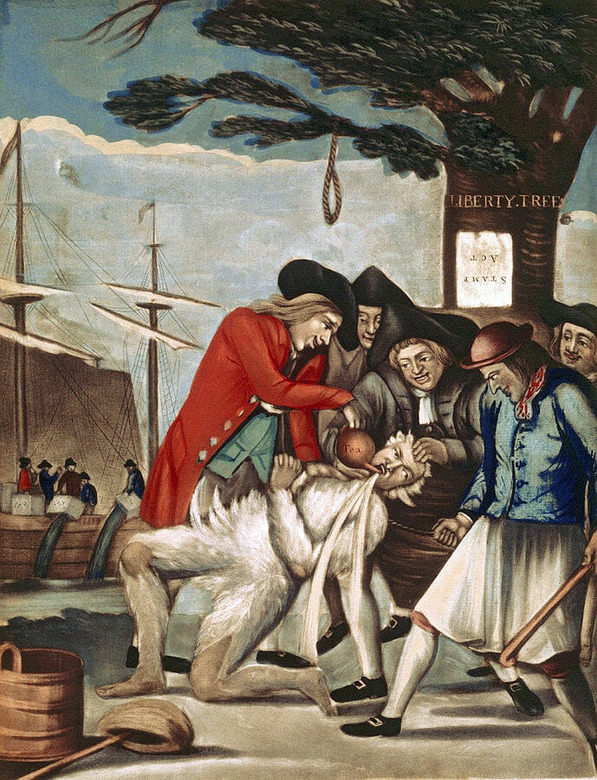- Subject:
- U.S. History
- Material Type:
- Module
- Provider:
- Ohio Open Ed Collaborative
- Tags:
- License:
- Creative Commons Attribution Non-Commercial
- Language:
- English
- Media Formats:
- Text/HTML
Imperial Reforms and Colonial Protests 1763-1774

Overview
The government’s formerly lax oversight of the colonies ended as the architects of the British Empire put these new reforms in place. The British hoped to gain greater control over colonial trade and frontier settlement as well as to reduce the administrative cost of the colonies and the enormous debt left by the French and Indian War. Each step the British took, however, generated a backlash. Over time, imperial reforms pushed many colonists toward separation from the British Empire.
Learning Objectives
Discuss the status of Great Britain’s North American colonies in the years directly following the French and Indian War
Describe the size and scope of the British debt at the end of the French and Indian War
Explain how the British Parliament responded to the debt crisis
Outline the purpose of the Proclamation Line, the Sugar Act, and the Currency Act
Explain the purpose of the 1765 Stamp Act
Describe the colonial responses to the Stamp Act
Describe the purpose of the 1767 Townshend Acts
Explain why many colonists protested the 1767 Townshend Acts and the consequences of their actions
Describe the state of affairs between the colonies and the home government in 1774
Explain the purpose and results of the First Continental Congress
Textbook Readings
U.S. History,OpenStax
Module Supplemental Readings/Videos
The American Revolution and Its Era: Maps and Charts of North America and the West Indies: https://www.loc.gov/collections/american-revolutionary-war-maps/
“Benjamin Franklin, An Account of the Paxton Boys’ Murder of the Conestoga Indians, 1764.”
Explore PAhistory.com http://explorepahistory.com/odocument.php?docId=1-4-26Collection of the Massachusetts Historical Society (http://www.masshist.org/revolution/stamp.php) to examine digitized primary sources of the documents
Full text of the Declaratory Act, in which Parliament asserted the supremacy of parliamentary power at Constitution.org
For examples of the types of luxury items that many American colonists favored, visit the National Humanities Center to see pictures and documents relating to home interiors of the wealthy.
The Boston Massacre Historical Society includes a discussion of the British and Loyalist view: http://www.bostonmassacre.net/british.htm
- To learn more about the Boston Tea Party, explore the extensive resources in the Boston Tea Party Ships and Museum collection:
(https://www.bostonteapartyship.com/?s=boston+tea+party&cat=199%2C342%2C203)
The British perspective on The Boston Tea Party, visit the Boston Tea Party Historical Society:http://www.boston-tea-party.org/british-view-new.html
Digitized transcript of the First Continental Congress’s petition to King George. http://www.masshist.org/revolution/doc-viewer.php?item_id=703&old=1&mode=nav
Glossary of Key Terms
Boston Massacre: Clash between unruly Bostonian protestors and locally-stationed British redcoats, who fired on the jeering crowd, killing or wounding eleven citizens
Boston Tea Party: Protest against the British East India Company's monopoly on the tea trade. Disguised as Indians, colonists dumped 342 chests of tea into Boston harbor, prompting the Coercive Acts from the British Parliament.
Coercive/"Intolerable" Acts Series of punitive measures passed in retaliation for the Boston Tea Party, closing the Port of Boston, revoking a number of rights in the Massachusetts colonial charter, and the Quartering Act to allow for the lodging of soldiers in private homes.
committees of correspondence: Local committees established across Massachusetts, and later in each of the thirteen colonies, to maintain colonial opposition to British policies through the exchange of letters and pamphlets.
Declaratory Act: Passed alongside the repeal of the Stamp Act, it reaffirmed Parliament's sovereignty over the North American colonies.
First Continental Congress: delegates from the colonies that met in response to the Coercive Acts.
nonimportation agreements: Boycotts against British taxation policies in the colonies.
Pontiac's uprising: Campaign waged by Ottawa chief Pontiac to drive the British out of Ohio Country.
Proclamation of 1763: Decree issued by Parliament in the wake of Pontiac's uprising, prohibiting settlement beyond the Appalachians. Contributed to rising resentment of British rule in the American colonies.
Quartering Act: Required colonies to provide food and quarters for British troops.
Quebec Act: Allowed the French residents of Québec to retain their traditional political and religious institutions and extended the boundaries of the province southward to the Ohio River.
Stamp Act: Tax on an array of paper goods, repealed in 1766 after mass protests erupted across the colonies. Colonists developed the principle of "no taxation without representation."
Sugar Act: Duty on imported sugar from the West Indies. It was the first tax levied on the colonists by the crown and was lowered substantially in response to widespread protests.
Townshend Acts: External, or indirect, levies on glass, white lead, paper, paint and tea, the proceeds of which were used to pay colonial governors, who had previously been paid directly by colonial assemblies.
vice-admiralty courts: designed to resolve disputes among merchants and seamen.
Instructor Resources
ADVISOR SUGGESTIONS TO KING GEORGE III & WASHINGTON
See attached PDF for details